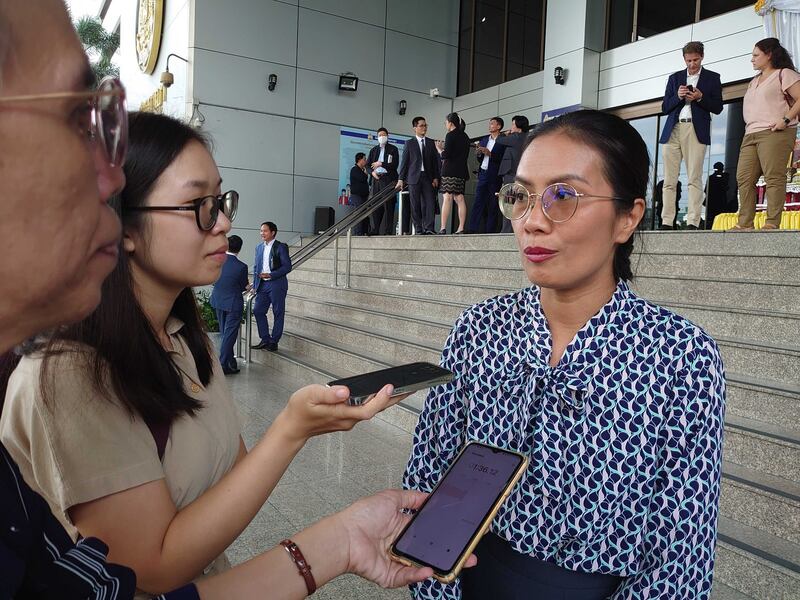Updated on Sept. 30, 2024 at 1:51 E.T.
A Thai court ruled on Monday that Montagnard activist Y Quynh Bdap should be sent back to Vietnam where he faces terrorism charges.
The judge at the Bangkok Criminal Court said there were sufficient grounds to approve the Vietnamese government’s extradition request.
Thailand’s government will have the final say on the fate of the human rights activist who said he fears he will be tortured, or even killed, if sent back.
“It is up to the government to execute the extradition in 90 days regardless of the court ruling,” the judge told the court.
Bdap has 30 days to appeal the case and if he has not been extradited within 90 days he must be set free, she said.
Dressed in a brown prison uniform, 32-year-old Bdab remained calm when the verdict was delivered. He was sent back to the Bangkok Remand Prison, where he has been held since his arrest on June 11.
RELATED STORIES
[ EXPLAINED: Who are Vietnam’s MontagnardsOpens in new window ]
[ Montagnard activists tells Thai court he has no terrorist linksOpens in new window ]
[ UN experts challenge Vietnam’s treatment of Montagnard minorityOpens in new window ]
Bdap is an ethnic Ede, one of about 30 minority groups in Vietnam’s Central Highlands who were called Montagnards, or hill people, by French colonialists.
The mainly-Christian people say they have faced years of discrimination over religion and land rights. Vietnam rejects accusations of rights abuses against the community.
A Vietnamese court charged Bdap with terrorism in January this year in connection with a June 2023 attack on two government offices in Dak Lak province, in which nine people were killed.
It sentenced him in absentia to 10 years in prison but Bdap denied involvement in the agitation and violence, which occurred when he was in Thailand.
Bdap, who co-founded a group called Montagnards Stand for Justice to fight discrimination, has lived with his family in Thailand since 2018.
Thai government to decide
The U.N. High Commissioner for Refugees has recognized him as a refugee even though Thailand has not ratified the 1951 convention on refugees, which outlines the legal protection, rights and assistance a refugee is entitled to receive.
Bdap is determined to fight extradition, according to his lawyer Nadthasiri Bergman.
“We are disappointed with the verdict. We are working on the appeal,” Bergman said.
Any extradition must be approved by the Thai government after the appeal court issues its verdict, she added.
“I hope the government and the prime minister will make an executive order not to extradite him,” she said.

The case has shone a spotlight on Thailand’s stand on human rights and on what rights groups say is an increasing tendency for countries in the region to crack down on foreign dissidents seeking refuge.
“It would appear that under considerable international pressure the court did not want to take the responsibility to extradite Y Quynh Bdap,” Andrea Giorgetta of the International Federation for Human Rights, or FIDH, told Radio Free Asia.
“The ball is now in the Thai government’s court and it is imperative that the Thai authorities comply with their national and international human rights obligations and allow Y Quynh Bdap to go free and resettle in a third country.”
Asia Human Rights and Labor Advocates Director Phil Robertson denounced the court’s ruling as “appalling and outrageous.”
“The Thai court … fundamentally failed to understand that Y Quynh BDap will certainly face torture if he's forced back to Vietnam. The court also ignored the wholly bogus and rigged nature of the original Vietnamese court verdict against him,” Robertson said.
2024 Amnesty
Meanwhile, Vietnam’s President To Lam on Monday granted pardons to 3,763 inmates in prison and two others whose sentences were suspended – but none of them were political prisoners.
Since 2009 the government has released over 92,000 prisoners through nine declarations of amnesty, but again none were political prisoners.
An announcement published last month said that those convicted of crimes related to national security, including “anti-state propaganda,” “conducting activities to overthrow people’s government” and “terrorism,” are not eligible for amnesty.
Among the prisoners to be released this time are 20 foreign nationals including nine Chinese and two Americans. They were convicted on various charges including murder, smuggling, gambling or immigration violations. They are expected to be freed on Tuesday.
RFA emailed the U.S. Embassy in Hanoi to seek information about the two Americans receiving the pardons but did not receive an immediate response.
The amnesty decision comes shortly after two prominent prisoners of conscience, Hoang Thi Minh Hong, and Tran Huynh Duy Thuc, were released ahead of the end of their prison terms in mid-September, shortly before General Secretary and President To Lam’s visit to the U.S.
Hong was serving three years for tax evasion related to an environmentalist organization she headed, whereas Thuc, who co-founded a human rights group, had been serving 16 years for "activities aimed at overthrowing the people's government," in connection with his online articles criticizing Vietnam’s one-party state.
Translated by Anna Vu. Edited by Mike Firn, Taejun Kang, and Eugene Whong.
Update adds information about 2024 amnesty.
